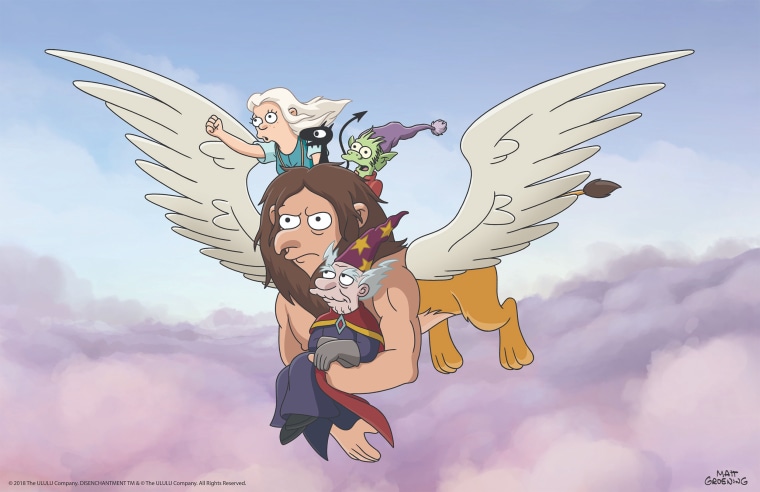Netflix Disenchantment Not as Funny as Futurama or Simpsons
Matt Groening has taken his cartoon landscape to Netflix, but he seems to have left the comedy behind. "Disenchantment," the famous animator's newest offering, desperately wants to be the fantasy answer to the cult sci-fi comedy "Futurama." Netflix executives probably hoped it would be the next "Simpsons."
Sadly, it is neither. Groening brought all his usual ingredients, from the bug-eyed character stylings that have been his hallmark since "Life In Hell" to the background gags spoofing our real world landscape. But like "The Simpsons" post-2001, Groening's new series is underwhelming. If anything, the series feels a little sad.
It's not particularly surprising "Disenchantment" fails to be enchanting. Groening works best when he's pushing the boundaries, not following the crowd.
It's not particularly surprising "Disenchantment" fails to be enchanting. Groening works best when he's pushing the boundaries, not following the crowd. When "The Simpsons" arrived in 1989, it was a show steeped in the sort of detached irony that would several years later become an emblem of the 1990s. "Futurama" was so ahead of the sci-fi curve when it arrived in 1999, it got canceled in 2003 — only to be sheepishly resurrected when pop culture caught up to it. For "Disenchantment" to have hit the way Groening's earlier shows did, it would have to have arrived ten years ago, before Netflix was even an option. Instead the show feels like Groening is no longer looking forward, but jumping on the train of yesterday's craze as the final car leaves the station.
It doesn't help that the characters feel so familiar as to be redundant. Rebellious Princess Bean (voiced by "Broad City" star Abbi Jacobson) is somewhere between a late teens Lisa from "The Simpsons" and Leela from "Futurama," which makes her the best character by miles, surrounded by characters who aren't anywhere near worthy of her. Similarly, Bean's pet demon feels like a cross between one of the Simpson family pets and Bender the Robot's evil personality, but without the gleeful menace. Elfo the lad elf (yes, that's an Elmo joke) is our Homer/Fry-like character, hapless, foolish, well-meaning and sort of falling through life without ever hitting the ground. Even the castle Bean lives in looks like someone took the Planet Express building from "Futurama" and just made it more medieval.
Our heroes decide to wander off on an adventure, which seems a splendid sort of way to start a fantasy story, except they don't really find adventure. Things happen to them, they muddle through the challenge, and then inexplicably they all go home and stay there. There's nothing particularly imaginative about the journeys these characters take, as if the writers thought simply the existence of a quest would be enough to keep audiences interested.
The writers have done their homework in worldbuilding, though. Like all good fantasy worlds, this is a place which has a solid logic behind it. (This is not "Family Guy," where random reigns supreme.) But the plots rely heavily on the setting for laughs, without finding specific fantasy tropes to parody. The animators are having fun, but it's a bad sign when one of the funniest jokes is a play on a pizza chain. (The evil apothecary is called "Little Seizures"; slogan "Poison! Poison!")

With a show that's merely middling, it is curious Netflix decided this was the series to push to critics this weekend, considering the plethora of premieres it had to pick from. Netflix is heavily promoting its original programming, which could cost $13 billion by year's end, up from original estimates of $8 billion.
As a result, Netflix is debuting no less than seven original programs this weekend. Along with "Disenchantment," they're also premiering two movies ("The Motive" and "To All The Boys I've Loved Before"), one drama series ("Ultraviolet"), one comedy special ("Magic For Humans"), one reality series ("Stay Here") and another animated series ("Pinky Malinky"). Perhaps due to Matt Groening's name recognition, Netflix is putting a lot of eggs into its "Disenchantment" basket.
It's a rare cartoon that can say it helped define a decade, let alone one that can claim it launched an entire broadcast network. "The Simpsons" looms so large over the animation landscape; those who have found success in its wake like "South Park" have included episodes like "The Simpsons Already Did It" to acknowledge how much is owed to the series that blazed the first trail. But it was also a cartoon that benefited from a very specific moment and era in television, arriving at a time before cable proliferation really took off, pre-internet speed of news and with a sense of humor that matched a culture in transition.
Groening, for what it was worth, understood he couldn't catch lightning in a bottle twice when he launched "Futurama" in 1999. Instead, he created a new set of characters and completely different world to stick them in. "Disenchantment" is missing that creative energy.
Trying to replicate the success of "The Simpsons" is understandable, but it's also frustrating. The times changed, the show didn't. Nowadays, it's basically a black hole on FOX's Sunday schedule, a show that continues to run on Newton's law of inertia as much as it does on Troy McClure's prophetic declaration that the cartoon will stay on the air until it becomes unprofitable.
Netflix's generalist thrust means it wants a series like "The Simpsons" in its arsenal — this is a niche the streaming service has yet to fill. But "Disenchantment" doesn't deserve the hype — at least not yet. In the process, it makes Netflix look like it cannot recognize good content from bad content, or in this case, merely filler content.
Ani Bundel has been blogging professionally since 2010. Regular bylines can be found at Elite Daily, WETA's TellyVisions, and Ani-Izzy.com.
Source: https://www.nbcnews.com/think/opinion/netflix-s-new-disenchantment-mediocre-mix-simpsons-futurama-ncna901596
0 Response to "Netflix Disenchantment Not as Funny as Futurama or Simpsons"
Post a Comment